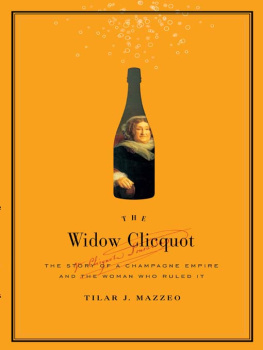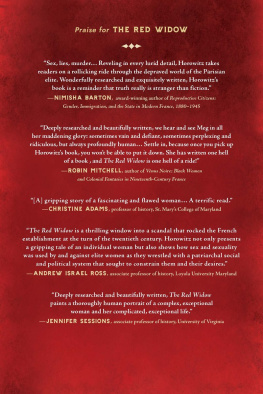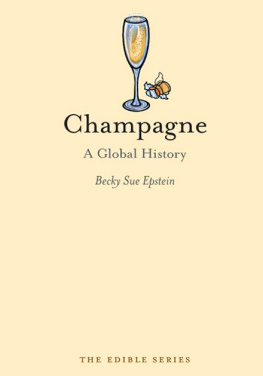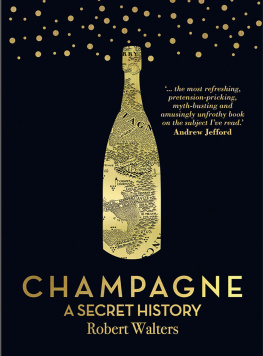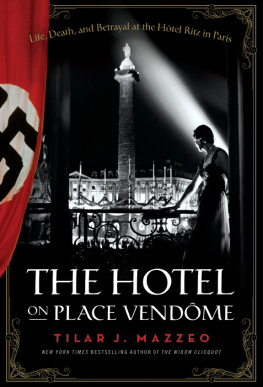T his is the story of French champagne, but it didnt start amid the splendor of a countryside chteau. Its origins were a more modest little luxury: the aisles of a well-stocked wine shop. It was a remarkably simple way to have begun an obsession with the history of one of the worlds great winesand one of the worlds great women. As much as we associate champagne with celebration and the good life, I should also tell you that, for me, it was a passion that began without fanfare in a small town in the American Midwest, where I was trying to weather what turned out to be the last months of a less than glamorous job.
It was in the midst of this daily livingand those occasional splurges that any sensible woman uses to temper itthat I discovered the Widow Clicquot. Although the writer in me wishes to tell you that my love affair with the Widow began in the spring, with the loosening of the earth and the promise of new life, that is not true. Winter had the Midwestern plains firmly in its Anglo-Saxon grasp, and I found myself gazing wistfully at a row of bubbly, dreaming of distant appellations and the sun-soaked vineyards of France.
I already knew the champagne. I dont mean that. My girlfriends and I drank it with a degree of enthusiastic regularity that might not be wise to detail. It was the story of Barbe-Nicole Clicquot Ponsardin that I discovered that afternoon, printed on a small card tucked into the box of the 1996 vintage Grande Dame that I had decided I certainly deserved.
The elegant little biography was less than thirty-five words, but it was a story that even in its outlines captured my attention that winter. It was the story of a woman raised to be a wife and mother, left widowed before thirty with a small child, with no training and little experience of the world, who grasped firmly at the reins of her own destiny and, through sheer determination and talent, transformed a fledgling family wine trade into one of the great champagne houses of the world. Here, I thought, is a woman who refuses to compromise.
In the years that followed, her story stayed with me, even after we had left the Midwest and settled in my then husbands home state of California in the hills of Sonoma County, where the winters are green-misted and indescribably soft. Something about this woman who took such immense risks to pursue her passion still resonated deeply, and I began odd little researches, hunting down nineteenth-century references to the Widow Clicquot in the local wine library in Healdsburg, practicing my rusty French reading old travel narratives written at the height of the Napoleonic empire. And, of course, never one to stint on rigorous research, I made sure that we tasted all the sparkling wine we could find, locally at first, and later in France, where I spent a windy January in a sprawling old farmhouse surrounded by nothing but muddy vineyards.
The trouble always was how to find the woman herself, this young widow with the unwieldy name of Barbe-Nicole Clicquot Ponsardin, the Veuveor WidowClicquot. At the beginning of the nineteenth century, when Barbe-Nicole was settling into her adulthood and all the compromises that come with it, the lives of entrepreneurs and commercial innovators rarely made the history books. This was especially true if that entrepreneur or innovator happened to be a woman. The archives are filled with the letters and diaries of statesmen and princes, but few librarians thought to collect the personal records of businesspeople, even businesspeople who did exceptional things. It is still true today. Most of us will never see our love letters preserved in the worlds great libraries. For a young woman in the nineteenth century it was particularly true, unless she was a queen or a duchess or the sister, wife, or mother of some great man.
Barbe-Nicole was none of those things. She was simply a formidable and independent woman, making her own name in the humdrum, dog-eat-dog world of business. When I finally made my way in the early months of 2007 to the Veuve Clicquot Ponsardin company archives in Reims, confident of discovering her private secrets, I found that the walls were lined with shelf after shelf of careful account books, all evidence of Barbe-Nicoles singular resolve. But there were few clues as to the woman behind the trademark yellow label.
So, instead, I dragged willing friends around the countryside of the Champagne that winter, looking for some trace of the life Barbe-Nicole must have known. Something that would explain not just how a young, sheltered woman broke free from the life other people had charted for her, but why . We bumped down rutted dirt roads in the rain, looking for the Widows vineyards in the fields above the village of Bouzy. In a fit of collective charm one afternoon, we persuaded the reluctant winemaker at Chteau de Boursault, once her favorite country home, to give us just ten minutes in the private grounds she had loved. I sat for hours in the cool silence of the cathedral of Notre-Dame de Reims, thinking that Barbe-Nicole knew these same walls well. Throughout it all, I found myself staring at buildings and street corners, stealing glimpses through windows like some thief, looking in vain for a woman and the finely woven texture of her life.
Sometimes I wondered if finding her private liferescuing her from the silence that engulfed her storywould be possible. Before my quest was over, I would meet with women winemakers and company presidents in sunlit Napa offices, searching for the modern incarnation of the Widow Clicquot, hoping to find in their experiences of a womans life in wine some way to untangle the past. Later, there was France. In small towns throughout the Champagne, La Veuveand in France there is only onelives in the shadowy half-life of oral folk legend. Frustrated with the dusty books and the archives, some days I simply asked the locals in bars and bistros to remember, knowing that remembering and inventing are close cousins, especially at the distance of two hundred years. We passed the wine from table to table in open bottles, and the chef came out from the kitchen to relax with a cigarette and to listen. In those moments, her presence was with us.
I like to think that the life of the Widow Clicquot has been slowly ripening in quiet darkness like some rare and wonderful vintage. Some of that darkness has been my life and my imagination. Some of it has been the darkness of history and the role of entrepreneurial men and, especially, women in it. But nowat lastis the time to enjoy it. As we all know, over time, wine becomes something different and more precious. The hard tannins mellow into smoothness; the flavors mature and ripen. In the nineteenth century, much of the Widows story wasnt worth saving. Today, its mere outlines are breathtaking. It is a tale that will change the way we think about the history of champagne and the role of one woman in it.
We all know the wine that Barbe-Nicole helped to make famous. No wine in the world brings to mind so many immediate associations as champagne. The pop of a cork and the bright sparkle of bubbles mean celebration and glamour and, more often than not, the distinct possibility of romance. It is the wine of weddings and New Years kisses. It is beautiful and delicate, and above all, it is a wine associated with women.

